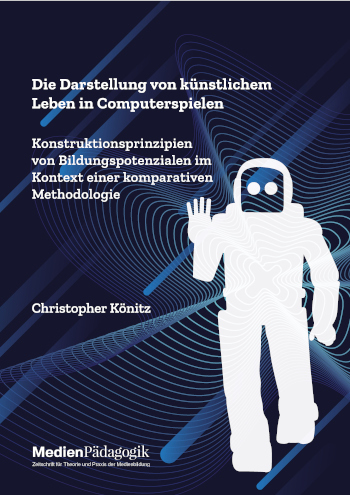Abstract
By the explorative study and the associated methodological preliminary considerations, a methodologically compatible comparative methodology was developed for the structural media education. In the last part of the thesis, the main findings and results from the two previous parts will be summarised and reflected upon. The focus here is on the two central questions of the thesis:
- What can a comparative methodology look like in the context of structural media education?
- Which construction principles for educational potentials can be derived from the comparative methodology?
Therefore, with regard to the developed analysis process, the aspects of sampling, material generation and the coding process, as the basis of the comparative methodology, will first be the focus of reflection. Subsequently, with a view to the higher coding levels, the construction principles of educational potentials will be examined in the context of the comparative methodology developed.
References
Biermann, Ralf. 2008. «Video Game (Film-) Essays: Der (etwas andere) Einsatz von Computerspielen zur Unterstützung von Lernprozessen». MedienPädagogik: Zeitschrift für Theorie und Praxis der Medienbildung 15: 1–14. https://doi.org/10.21240/mpaed/15_16/2009.02.25.X.
Bode, Karl, und Emanuel Maiberg. 2019. Nintendo Makes It Clear that Piracy Is the Only Way to Preserve Video Game History. vice.com. https://tinyurl.com/y729tdzj.
Charmaz, Kathy. 2014. Constructing Grounded Theory. SAGE.
Clarke, Adele E. 2011. «Von der Grounded-Theory-Methodologie zur Situationsanalyse». In Grounded Theory Reader, herausgegeben von Günter Mey und Katja Mruck, 207–229. Wiesbaden: VS Verlag für Sozialwissenschaften. https://doi.org/10.1007/978-3-531-93318-4_10.
Clarke, Adele E. 2012. Situationsanalyse: Grounded Theory nach dem Postmodern Turn. Interdisziplinäre Diskursforschung. Wiesbaden: Springer VS. https://doi.org/10.1007/978-3-531-93320-7
Glaser, Barney G, und Anselm L Strauss. 1998. Grounded theory. Strategien qualitativer Forschung. Göttingen: Verlag Hans Huber.
Heise, Christian. 2018. Von Open Access zu Open Science: zum Wandel digitaler Kulturen der wissenschaftlichen Kommunikation. Lüneburg: meson press. https://doi.org/10.14619/1303.
Herb, Ulrich. 2015. Open Science in der Soziologie: eine interdisziplinäre Bestandsaufnahme zur offenen Wissenschaft und eine Untersuchung ihrer Verbreitung in der Soziologie. Schriften zur Informationswissenschaft. Glückstadt: vwh, Verlag Werner Hülsbusch, Fachverlag für Medientechnik und -wirtschaft. https://doi.org/10.5281/zenodo.31234.
Honer, Anne. 2008. «Lebensweltanalyse in der Ethnographie». In Qualitative Forschung, herausgegeben von Uwe Flick, Ernst von Kardorff, und Ines Steinke, 194–203. Reinbek: Rowohlt.
Hopf, Christel. 2008. «Qualitative Interviews – ein Überblick». In Qualitative Forschung, herausgegeben von Uwe Flick, Ernst von Kardorff, und Ines Steinke, 6. Aufl., 349–368. Reinbek: Rowohlt.
Hugger, Kai-Uwe, und Ilona Cwielong. 2009. Medienbildung als Umgang mit gesellschaftlicher Kontingenz in und mithilfe von Medien. https://tinyurl.com/uwmdfpd.
Jenkins, Henry. 2003. Transmedia Storytelling. https://www.technologyreview.com/s/401760/transmedia-storytelling/.
Jenkins, Henry. 2008. Convergence culture: where old and new media collide. New York: New York Univ. Press.
Jörissen, Benjamin, und Winfried Marotzki. 2009. Medienbildung – Eine Einführung: Theorie – Methoden – Analysen. 1. Aufl. Stuttgart: UTB. https://doi.org/10.36198/9783838531892.
Jung, Matthias. 2005. «‹Making us explicit›: Artikulation als Organisationsprinzip von Erfahrung». In Anthropologie der Artikulation: begriffliche Grundlagen und transdisziplinäre Perspektiven, herausgegeben von Magnus Schlette und Matthias Jung. Königshausen & Neumann.
Konrad, Klaus. 2010. «Lautes Denken». In Handbuch Qualitative Forschung in der Psychologie, herausgegeben von Günter Mey und Katja Mruck, 476–490. Wiesbaden: VS Verlag für Sozialwissenschaften. https://doi.org/10.1007/978-3-531-92052-8_34.
Marotzki, Winfried, und Benjamin Jörissen. 2008. «Wissen, Artikulation und Biographie: Theoretische Aspekte einer Strukturalen Medienbildung». In Pädagogische Medientheorie, herausgegeben von Johannes Fromme und Werner Sesink, 51–70. Wiesbaden: VS Verlag für Sozialwissenschaften / GWV Fachverlage GmbH Wiesbaden. https://doi.org/10.1007/978-3-531-90971-4_4.
Sandmann, Angela. 2014. «Lautes Denken – die Analyse von Denk-, Lern- und Problemlöseprozessen». In Methoden in der naturwissenschaftsdidaktischen Forschung, herausgegeben von Dirk Krüger, Ilka Parchmann, und Horst Schecker, 179–188. Berlin, Heidelberg: Springer. https://doi.org/10.1007/978-3-642-37827-0_15.
Schemer-Reinhard, Timo. 2017. «Let’s Play without Controller. Zu den Effekten des Verschwindens der Steuerung im remediatisierten Game». In Phänomen Let’s Play-Video, herausgegeben von Judith Ackermann, 55–69. Wiesbaden: Springer Fachmedien Wiesbaden. https://doi.org/10.1007/978-3-658-12936-1_5.
Strauss, Anselm L, und Juliet M Corbin. 1996. Grounded theory: Grundlagen qualitativer Sozialforschung. Weinheim: Beltz.
Venus, Jochen. 2017. «Stilisierte Rezeption. Überlegungen zum epistemischen Status von Let’s Play-Videos». In Phänomen Let’s Play-Video, herausgegeben von Judith Ackermann, 19–29. Wiesbaden: Springer Fachmedien Wiesbaden. https://doi.org/10.1007/978-3-658-12936-1_2.
Verständig, Dan, und Jens Holze. 2017. «It’s not just a game – Subversive Praktiken in digitalen Spielkulturen». In Phänomen Let’s Play-Video, herausgegeben von Judith Ackermann, 225–239. Wiesbaden: Springer Fachmedien Wiesbaden. https://doi.org/10.1007/978-3-658-12936-1_16.

